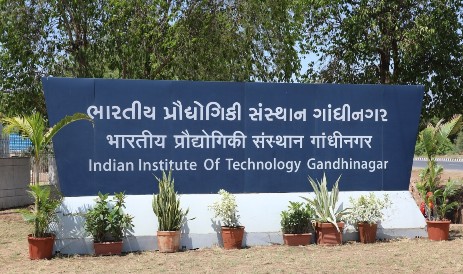IIT Gandhinagar releases a Whitepaper on the development and management of a Covid Care Facility on the campus
Gandhinagar: Sharing standard protocols and lessons learnt from its own experience, the Indian Institute of Technology Gandhinagar (IITGN) today released a Whitepaper on developing and managing a community Covid Care Facility on campus. The Institute aims to encourage other institutions and communities to develop similar facilities to provide support and relief to their community members and reduce the strain on the national medical infrastructure in the fight against the global pandemic.
As more than 500 districts all over India hit a positivity rate in excess of 10 percent, the Health Ministry yesterday called for the creation of 30-bed Covid Care Centres in schools, community halls and panchayat buildings. Similar facilities can also be created in educational institutions, housing societies and other communities.
At a time of increasing national and local demand for Covid beds, oxygen concentrators, oxygen tanks, respirators, etc., IITGN provided relief to Covid infected community members by converting its newly constructed guest house into a fully functional isolation cum Covid Care Facility, which also contributed to reducing the burden on Ahmedabad and Gandhinagar’s healthcare infrastructure.
Based on the defining Institutional principles of inclusivity and empathy, the facility provided isolation and health support to the entire IITGN community, including students, project staff, faculty, admin staff, and contractual workers, such as drivers, mess staff, housekeeping staff, gardeners, security personnel, construction workers and their family members.
More than 240 Covid patients were served at the facility between April 1 through May 15, including a peak of 95 in mid-April. All but one patient had been released from the facility on May 16. At its peak in the month of April, IITGN had 248 active Covid-19 cases, of which 162 were on campus and the remaining among off-campus students, staff, outsourced workers and their families.
Covid positive patients from the community with mild to moderate symptoms were housed in this facility. It provided them basic medical services, such as regular temperature and oxygen monitoring, advice from doctors and nurses of the Institute, medicines, blood and RT-PCR tests, hard-to-access health services, such as oxygen concentrators and tanks, and nutritious meals four times daily. Institute medical staff and ambulance services are available 24×7. The facility also helped patients find beds in local hospitals if needed. Counselling services offered psychological support to patients, medical staff, and their families.
Explaining the motive behind developing and releasing this Whitepaper, Prof Sudhir Jain, Director, IITGN, said, “We are experiencing an unprecedented global health crisis that demands unconventional and urgent action to support and care for each other. At IITGN, we did not have the benefit of a guiding document or a standard operating procedure that we could follow at the start. We evolved with every challenge and learnt lessons during the process. This Whitepaper is released with the hope that our experience and lessons can inform other institutions and organisations interested in developing similar facilities to support their communities during the pandemic. We are glad that we could do our bit to reduce the burden on the medical infrastructure of the state and at the same time provide safe and critical medical care for Covid patients in our community.”
Besides highlighting the benefits of a Covid Care Facility and the journey of setting up a 190-bed community care facility on the campus, the document outlines the protocols, SOPs, guidelines, and necessary medical support and essential supplies for setting up such a facility for the community. It points out how various organisations and even residential communities can utilise their available infrastructure and human resources to set up similar facilities.
Well structured protocols are essential for every process at the facility, and the Whitepaper outlines several of them, in such areas as:
1. Staff and volunteers 2. Physical space development
3. Food supplies and delivery 4. Maintenance of infrastructure
5. Transportation 6. Medical services
7. Medical supplies 8. Counselling
9. Waste management 10. Infection prevention measures
The Whitepaper is available to the public at https://iitgn.ac.in/pdf/ccf.pdf

